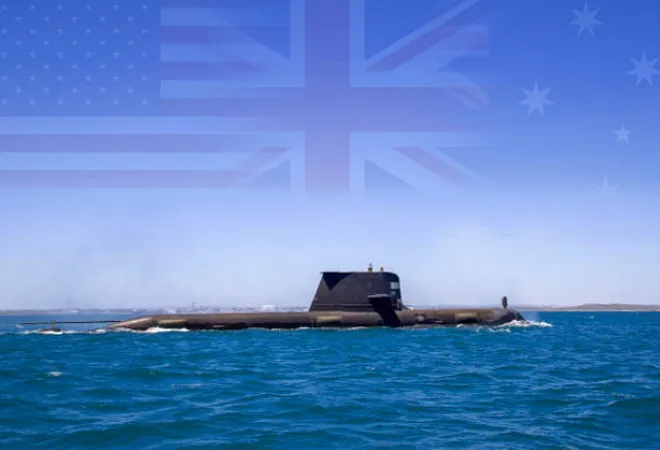
In September 2021, the United Kingdom (UK), the United States (US), and Australia entered into a historic security pact with the aim of countering a rising China. The initiative, called AUKUS, was announced jointly by the US President Joe Biden and Prime Ministers Boris Johnson and Scott Morrison in a meeting convened virtually. This agreement enables Australia to build nuclear-powered submarines using the technology provided by the United States, which the US had only shared with Britain previously. The AUKUS pact is also said to cover AI and other technologies, sharing of cyber technologies and other undersea technologies. The focus will be primarily on military capability.
The joint statement describes the pact as “an historic opportunity for the three nations, with like-minded allies and partners, to protect shared values and promote security and prosperity in the Indo-Pacific region”. The UK government, in its statement, highlighted that, “Under the ‘AUKUS’ alliance, we will enhance the development of joint capabilities and technology sharing, ensuring our people are kept safe from harm and reinforcing our shared goals. AUKUS will foster deeper integration of security and defence-related science, technology, industrial bases and supply chains.” The Australian Prime Minister, Scott Morrison was quoted as saying that teams from the three countries would work and come up with a joint plan in the next 18 months for assembling the new Australian nuclear-powered submarine fleet for the Royal Australian Navy, to be built in Adelaide. For Australia, AUKUS leads the way for deployment of nuclear-powered submarines for longer periods with greater capability to improve deterrence across the Indo-Pacific.
The joint statement describes the pact as “an historic opportunity for the three nations, with like-minded allies and partners, to protect shared values and promote security and prosperity in the Indo-Pacific region”.
The multi-dimensionality of AUKUS, such as enhancing deeper military interoperability and extending cooperation in newer emerging areas such as cyberspace, Artificial Intelligence (AI) and quantum technologies strengthens Australia’s position in the Indo-Pacific to deter China’s expansion in the region.
The China factor
Though the joint statement refrains from mentioning that this partnership is focused on dealing with an assertive China, but nations of the Indo-Pacific, especially Australia, have been widely concerned with China’s growing infrastructure investments in the Pacific Island states, which is Australia’s backyard, and also China’s trade sanctions against Australia after it initiated the probe to investigate the origins of the COVID-19 virus.
In the past years, Australia did maintain cordial relations with China, but this relationship has hit a stumbling block in the recent years. Additionally, China’s belligerence in the South China Sea, in Hong Kong, and the Taiwan Strait have led to growing wariness amongst the countries of the Indo-Pacific. President Biden after the finalisation of the defence agreement said, “We need to be able to address both the current strategic environment in the region, and how it may evolve, because the future of each of our nations and indeed the world, depends on a free and open Indo-Pacific enduring and flourishing in the decades ahead.”
Reactions of countries of the Indo-Pacific Region
Australia has made it clear that it will abide by the Nuclear Non-Proliferation Treaty (NPT) and remains committed to fulfilling all of its obligations as a non-nuclear weapons state, including with the International Atomic Energy Agency. Some countries have still expressed their concern that “this decision could indirectly spur the proliferation of weapons”. Most specifically, the Chinese Foreign Ministry has proclaimed that, “ The nuclear-powered submarine cooperation has seriously undermined regional peace and stability, intensified the arms race and undermined international non-proliferation efforts.”
Asia
Southeast Asian nations like Indonesia said, “It was cautiously watching the Australian nuclear submarine decision, expressing concern about a regional arms race and power projection capabilities.” The Malaysian Prime Minister too expressed “concern over the AUKUS cooperation, which will catalyse the nuclear arms race in the Indo-Pacific region". The Southeast Asian counterparts are concerned that this may provoke China to act even more aggressively in the South China Sea. On the other hand, some ASEAN countries like the Philippines and Vietnam are content to see the greater involvement of extra-regional countries, which they feel will help “counter Chinese aggression and coerciveness in the region”. Australia’s Quad partner countries like Japan have welcomed this arrangement. India, on the other hand, has pointed out that, “AUKUS will not affect plans to strengthen the Quad. India sees the two as very different groupings, describing AUKUS as a security alliance, and indicating that security is not the Quad’s main focus. Also, India does not wish to link AUKUS to Indian interests.”
The nuclear-powered submarine cooperation has seriously undermined regional peace and stability, intensified the arms race and undermined international non-proliferation efforts.
Europe
The AUKUS agreement has brought an abrupt end to the 2016 submarines deal Australia had inked with France. The fallout between France and AUKUS states has created awkwardness in the Indo-Pacific and further established the divide in trans-Atlantic ties, which has been under severe stress following the US unilateral decision to withdraw its forces from Afghanistan. The faltering transatlantic relations necessitates for a European strategic autonomy by Brussels amidst the Afghan crisis but with the recent nuclear-submarine deal, AUKUS has side-lined France and the EU from Indo-Pacific, prompting France to recall its ambassadors from Canberra and the United States for the first time in its 243 year-long association.
France plays a strategic role in the Indo-Pacific owing to its French overseas territories in the region. Moreover, the region’s increasing share of world trade and investment combined with growing maritime trade traffic alerted France to step up its ambitions beyond Françafrique in the Indo-Pacific after decades of low allocation of budgets. The change in France’s Indo-Pacific importance was realised after President Macron declared France as an Indo-Pacific Power, ironically in Sydney in May 2018 where France became the first EU member state to adopt the notion of the Indo-Pacific, thereby outlining its strategy towards the region.
The fallout between France and AUKUS states has created awkwardness in the Indo-Pacific and further established the divide in trans-Atlantic ties, which has been under severe stress following the US unilateral decision to withdraw its forces from Afghanistan.
However, the signing of AUKUS has jolted France’s ambitions in the Indo-Pacific questioning its claims as an Indo-Pacific power. Canberra’s nod to Washington over Paris has derailed Macron’s ambitions in the region against China’s expansionist ambitions. Australia’s cancellation with France for the Attack-class submarines will result in paying a heavy penalty worth hundreds of millions of Euros. France remains livid with Australia and the US’ decision as French foreign minister Jean-Yves Le Drian and armed forces minister Florence Parly openly expressed disappointment at Australia’s decision-making to abandon France for AUKUS.
Since the signing, France has recalled its ambassadors from Canberra and Washington, postponed Franco—British Defence Ministers’ Summit, and possibly delayed the EU—Australia trade agreement negotiations as a majority of the EU leaders rallied for France citing breach of trust by its transatlantic and Indo-Pacific allies. Michael Roth, German Minister for European Affairs, reflected on AUKUS as a wake-up call for the Europeans as the EU often remains divided over foreign and security policy issues. Furthermore, the EU, guided by France, could delay its FTA arrangement with Australia as several EU member states resonate on a mutual feeling—trust deficit. The EU holds no grudges against Australia, but the trust deficit needs to be overcome by focusing on non-defence issues such as trade and economy to improve their bilateral relations and complement each other in their shared vision of the Indo-Pacific.
Australia and the US along with other like-minded countries in the Indo-Pacific—India and Japan—have already been active in dealing with security challenges confronting the Indo-Pacific region. UK has been a recent addition to these like-minded countries grouping. In recent weeks the UK’s HMS Queen Elizabeth Carrier has been deployed to the Indo-Pacific region alongside personnel and equipment from the US. Last month the Carrier Strike Group undertook a series of exercises with countries including Australia to build interoperability with like-minded partners. For the UK, AUKUS is its most significant milestone since its new Indo-Pacific strategy was set out in its 2021 defence and foreign policy review.
The EU, guided by France, could delay its FTA arrangement with Australia as several EU member states resonate on a mutual feeling—trust deficit.
The EU–US relations since the Afghan crisis has demanded implementation of a European Strategic Autonomy for Brussels and now with their newly launched Indo-Pacific strategy, the EU looks at launching the “Global Gateway” to counteract China’s Belt and Road Initiative (BRI). The EU gazes at the Indo-Pacific region to build on its existing relations to further itself as a political, economic, and military actor in the region. The remarks passed by Ursula von der Leyen, President of the European Commission, inadvertently highlights the bruise not just on Paris but also on Brussels as Europe is at the backseat of decision-making, at least through Washington’s field of vision. In the Biden-Harris Administration, Asia precedes Europe as the US aims at securing the Indo-Pacific by aligning with like-minded democracies and regional multilateral groupings.
The AUKUS agreement does bring its share of benefits and opportunities for Australia, especially this new trilateral partnership, but at the same time, the reactions of its other partners in Asia and Europe does put forward some challenges as well, which Australia will have to diplomatically tackle. Given that the ultimate goal that Australia espouses in its Indo-Pacific policy is working with like-minded countries and partners in the Indo-Pacific region, then these growing wariness from both the sides of the Asian and European countries cannot be taken lightly.
The views expressed above belong to the author(s). ORF research and analyses now available on Telegram! Click here to access our curated content — blogs, longforms and interviews.




 PREV
PREV



